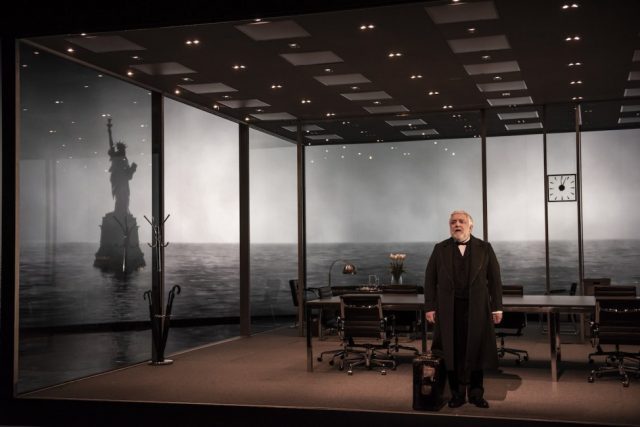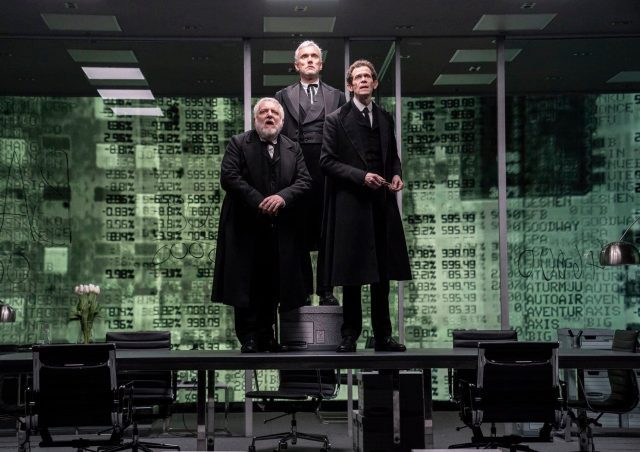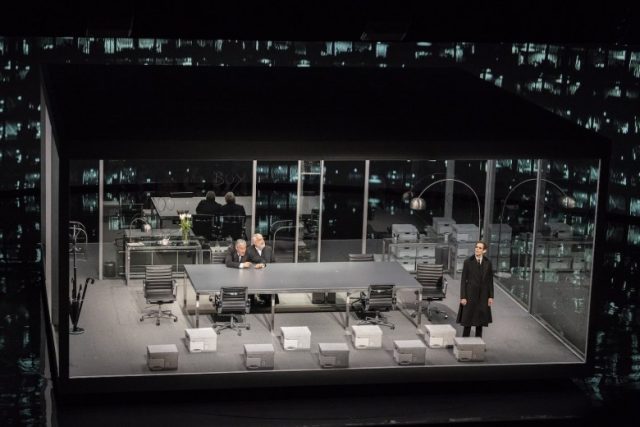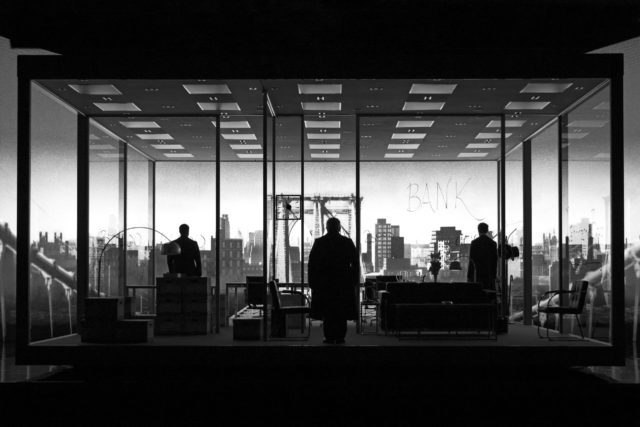
The Lehman Trilogy takes place on Es Devlin’s stunning stage (photo by Julieta Cervantes)
THE LEHMAN TRILOGY
Nederlander Theatre
208 West 41st St. between Seventh & Eighth Aves.
Tuesday – Sunday through January 2, $59-$209
877-250-2929
thelehmantrilogy.com
“The prospect of sitting through a nearly three-and-a-half-hour play about the history of Lehman Brothers performed by a mere three actors might not necessarily be your idea of fun,” I wrote about the American premiere of The Lehman Trilogy at Park Avenue Armory in the spring of 2019. But it turned out to be what I called “an epic masterpiece, must-see theater at its finest.”
Still, the prospect of watching it two and a half years later, at the Nederlander Theatre on Broadway with two of the same actors amid a continuing pandemic, was not necessarily my idea of fun. But it turned out to once again be must-see theater at its finest.
Adapted by writer Ben Power and director Sam Mendes from Stefano Massini’s five-hour Italian original, the dazzling play relates the history of the men behind the business, siblings Henry (Simon Russell Beale), Mayer (Adam Godley), and Emanuel Lehman (Adrian Lester), who were born and raised in the small town of Rimpar in Bavaria and arrived, individually, in the United States between 1844 and 1850, operating a fabric store in Montgomery, Alabama. Over the years, they change with the times and the needs of the market, selling raw cotton, coffee, and coal and, eventually, trading money, building a vast empire that came crashing down in the 2008 financial crisis. Henry is considered the head, with the most business sense; Emanuel the arm, able to forcibly get things done; and Mayer the potato, an unequal partner who serves as the mediator. As the firm develops, the evolving name of the company is written and rewritten on glass walls, a constant reminder of where they were and where they are going.
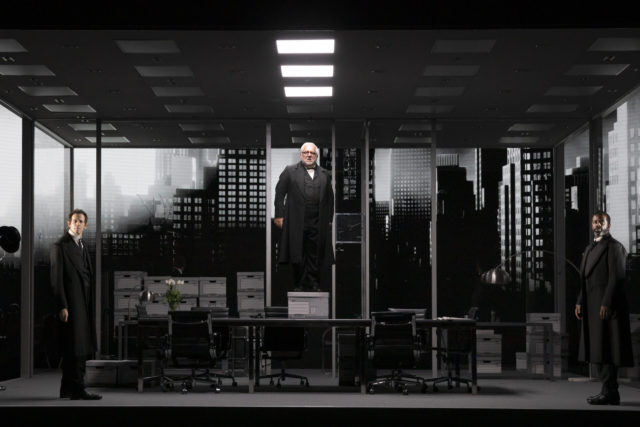
Adam Godley, Simon Russell Beale, and Adrian Lester play multiple roles in The Lehman Trilogy (photo by Julieta Cervantes)
The story is told primarily in the third person, an ingenious decision that adds an extra dimension to the characters, giving them each a unique perspective on themselves and their family.
Henry: Every morning, like this morning, they get up at five in their three-room home.
Mayer: They light the lamps with whale oil and wash with one pail of water between them.
Emanuel: This is worse than Germany! Emanuel said on his third day in America.
Mayer: After the slap that Henry laid on his face he never said it again.
Henry: Every morning, like this morning, while Montgomery sleeps, they pray together before leaving.
Emanuel: Just as they did in Bavaria. They put on their hats and go out.
Mayer: Another day.
The narrative is divided into three chapters, “Three Brothers,” “Fathers & Sons,” and “The Immortal,” as their fame and fortune rises through the next generations, which include Emanuel’s ruthless son, Philip (Beale); Mayer’s son, Herbert (Lester), who believes in fairness, stability, and security, not the Lehman tradition of risk taking; and Philip’s son, “Bobby” (Godley), who loves the limelight and becomes the very public face of the company. “No one outside this family can ever truly understand. What we’ve done. Why we did it. What we plan to do next,” Philip says. Bobby answers, “At Yale they teach us that nothing is more outdated as betting on industry. The times are changing, Father. The new century will wipe everything away.” He doesn’t know how right he is.
The play takes place on Es Devlin’s gorgeous set, a large, revolving transparent cube with several office-like rooms. Video designer Luke Halls projects geographic scenes onto the huge semicircle at the back of the stage and onto the floor around the cube, from the vast sea and plantation estates to cotton fields and the New York City skyline. As good as it all looks, the set lacks the magic and power it had in the armory’s massive Wade Thompson Drill Hall; it feels too cramped on the Nederlander stage, where, depending on where you’re sitting, you’re unlikely to get its full impact.
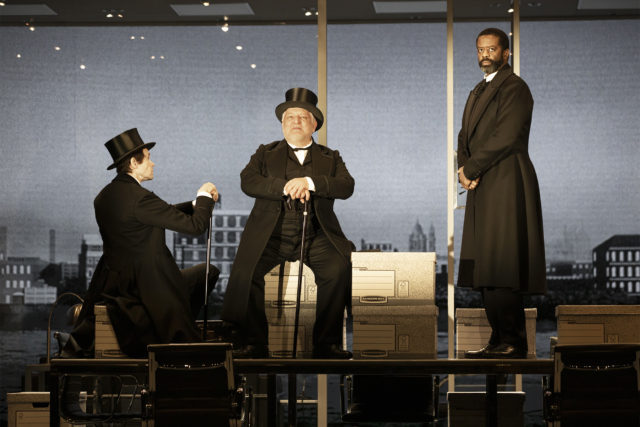
The history of the Lehman brothers is told by three actors in sensational production (photo by Julieta Cervantes)
Beale (Candide, Uncle Vanya), Godley (Rain Man, Anything Goes), and Olivier winner Lester (Red Velvet, Company), who replaces Ben Miles as Emanuel, are majestic, an absolute marvel. The three men have a commanding presence, balancing humor and gravitas as they move about the cube, using office packing boxes as furniture, arranging them into steps, furniture, and even a piano. (A real piano is played offstage by Candida Caldicot.)
Oscar, Tony, and Olivier winner Mendes (The Ferryman, American Beauty) and Power (Emperor and Galiean, Husbands and Sons) have made a few tweaks to the show in the wake of the Covid-19 crisis and the George Floyd protests. When Mayer discusses how the company benefits from plantations and slaves, Henry notes, “Doctor Beauchamp, who once treated the children of those slaves for chickenpox, now shakes his head the way he once did about yellow fever: ‘Surely you knew it could not last, Mr. Mayer? Everything that was built here was built on a crime. The roots run so deep you cannot see them but the ground beneath our feet is poisoned. It had to end this way.’” But “Mayer doesn’t want to hear. So day and night, he tries to convince himself that, although the war is lost, the South if you look hard enough still stands, is not dead.”
Later, in a Greek diner in Nebraska, Henry relates the story of its owner, Georgios Petropoulos: “He crossed the country in 1918 when the soldiers brought the influenza back from Europe and half a million Americans died. He saw the priests collecting the bodies off the street in Philadelphia, and the protests in San Francisco, against the wearing of masks.” At the Nederlander, employees walk up and down the aisles, making sure all audience members are wearing their masks correctly, over their mouth and nose.
Despite running more than three hours with two intermissions, The Lehman Trilogy flies by, moving faster than the Dow Jones stock ticker. It’s also a whole lot more satisfying, with Power, Mendes, and the outstanding cast taking all the risks and leaving all the rewards for the audience.
